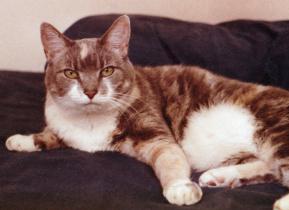 When my sister Alice was living in an apartment on the upper west side of Manhattan, one of her neighbors took in a homeless cat. But the neighbor didn't want to keep it, and Alice, not wanting it to be put back out onto the street, took it in. My memory is fuzzy on the exact sequence of events, since this was back in the early seventies. As I've always remembered the story, Alice was petting the cat one day, and found that it had a lump on its chest. As a result, Alice took her off to a veterinarian to be examined. The vet diagnosed the cat as having a malignant breast tumor, and asked what Alice wanted to do. Since the cat was a street cat that Alice had only had for a short amount of time, the vet wondered if Alice might just want to have the cat euthanized. But of course, cats can worm their way into your affections pretty quickly, and Alice rejected that idea. Couldn't the cat be saved? Well, yes, a mastectomy could be done, but it would be costly. Although the fee was quite a bit of money for Alice at the time, she agreed to pay, and scheduled the surgery. In addition to the malignant tumor, it turned out that the cat was pregnant. The simplest procedure would have been to abort the kittens, but Alice wasn't fond of that idea. Couldn't the kittens be saved as well? Well, yes, but that increased the cost of the operation (I think it required the use of a different anesthetic). Alice gave the OK. A mastectomy on a cat requires the removal of all four teats on one side, since they are interconnected, and a breast malignancy will otherwise recur on the same side. The cat came through the surgery successfully, still pregnant, and after healing, successfully gave birth to four kittens. This is the average size of a cat litter (see my entry, Why do women have two breasts), and in this case, it was a fortuitous number, since it allowed her to successfully nurse all four kittens with the remaining four teats that had not been removed. I've always thought that when this cat came in from the cold, she hit the jackpot. She had come indoors, apparently, mainly to find a safe place to give birth to her kittens, but in doing so, she had chosen wisely (or at least fortunately). She had found not only food and shelter, but also free medical care (which is more than most human American citizens have). She had located Alice's Restaurant and Cat HMO.Note 1
Some readers might imagine that cats could be a threat to a bird, but really, it was the other way around. Harold is a very large bird, about 79 cm long (2 feet 7 inches) from the top of his head to the tip of his tail feathers. And he can open walnuts with his beak. The cats spent part of their lives in rural New Jersey, where they could wander outdoors, and they eventually ended up in Alice's current apartment in mid-town Manhattan. Estelle and Elliot lived the longest, Elliot surviving to the ripe old cat age of nineteen and a half years. This is really Alice's story, but I've told it so many times that it seems like mine.
  Note 1: For readers in the distant future who might not get the references: "Alice's Restaurant" is the name of a very well known folk song by Arlo Guthrie. An "HMO" is a "Health Maintenance Organization", a form of private health insurance. Given the way things are going right now at the beginning of the year 2011, I suspect that in 2050, the United States will still be the only major industrialized country in the world that doesn't guarantee health care to all its citizens. [return to text] Note 2: I once read a story, I think in Reader's Digest, about a pet cat that disappeared every Sunday. One Sunday, the owner followed it, curious about where it was going. It travelled quite a distance, crossing several streets (carefully waiting until there were no cars in sight), until it arrived at a church. The owner wondered, "Is my cat going to church on Sundays?" The cat jumped up onto a window sill, and sat looking through the open window (it was summer). The owner came up behind, and also looked in. Inside was a large hall, containing many people seated at tables. The cat, watching intently, seemed to react with delight every time someone inside jumped up and yelled, "BINGO !!" [return to text]
 |
 The kittens were named Elliot, Betty (shown to the left), Estelle, and Sam, and the mother came to be called "Little Momma". They were all present at the arrival of Alice's Blue and Gold
Macaw
The kittens were named Elliot, Betty (shown to the left), Estelle, and Sam, and the mother came to be called "Little Momma". They were all present at the arrival of Alice's Blue and Gold
Macaw